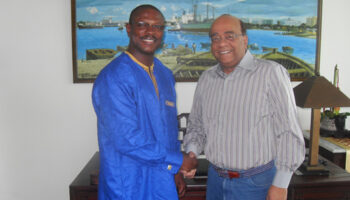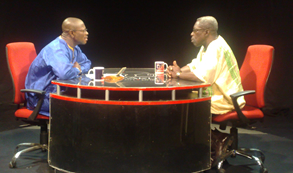Kabral Blay-Amihere, came to national attention as a student leader in the mid-seventies and later as a columnist whose militant thoughts and stirring diaries were compelling reading.
The Journalist, Teacher and Diplomat, was born at Ekwe, a village in the Western Region.
At age 28, he became the Director of the Ghana Institute of Journalism. Educated at Legon, London School of Economics and Harvard, Blay Amihere, is one of the widest travelled men in this country.
As the Ghana Institutes of Journalism, celebrates Golden Jubilee, what does he think about contemporary journalism in Ghana?
We will also discuss his forthcoming book, “Between the Lion and the Elephant”, as well as the Council on Foreign Relations that’s just about to take off and which he promises will rival any International Relations Think Thank in Africa.
Here are some highlights of his interview on Kwaku One-on-One.
KSA:
As a journalist, what did you tell the students of the Ghana Institute of Journalism during your lecture in commemoration of the Institute’s 50th Anniversary?
KBA:
I said, I as a journalist will not want to be the foot note of a politician. I as a journalist will not want to be the defender of a politician. I can only empathize with them but we have a situation now where by journalists have become the megaphones of politicians…
KSA:
But I remember you said earlier that, every writer is a “write politics”
KBA:
But it does not mean that you are in politics for any interest group. It doesn’t mean that you should become embedded with the politician. When you get to that level, then your views become joined with his.
KSA:
Well, there were no political parties to support?
KBA:
No! There was a time when I was a time when I was writing as a columnist for spectator in the past and PNP was in power. And where I am coming from, I should have been closer to PNP…
KSA:
Because you are Nkrumahist?
KBA:
And even two of my siblings were Deputy Ministers but I remember one of my articles that I wrote about his style of leadership; “A Leader or a President “. I was very critical of Limann. But what I am saying is that, we have every right to do that. Now we have a decline in the print group but some of them will jubilate when there is a political turnover.
KSA:
Yet, you wrote editorials in support of President Kufuor’s candidacy?
KBA:
Well, before then Adu-Boahen.
KSA:
Isn’t this a contradiction?
KBA:
It’s a tradition in the United States. In fact, the’ Independent’ was one of the first to take up that structure…
KSA:
The ‘Independent’ being the paper you founded?
KBA:
But you see, even when you were in those, you should offer readers reasons because, at the end of the day, they have a choice to decide who to vote for.
KSA:
On what grounds did you endorse Ex-President Kufuor?
KBA:
I got to know Ex-President Kufuor in 1991. I believed that under his stewardship, Ghana’s democracy would grow. He brought dignity to the office. I can’t judge him but posterity will judge him. And when the records come to be written, it will be said that Kufuor took our democracy to higher grounds.
KSA:
You were also a supporter or should I say an empathizer of Jerry Rawlings.
KBA:
I wouldn’t put it that way. You see, in the 80’s because of the conditions then, you can’t just dismiss him. Jerry meant well for this country. I live this judgment for history but he did his best during the 19years of rule. And if you travel outside Ghana, you hear about him. Of course, there are many aspects that you can not ran away from, like human rights records etc., but when you look at the balance sheet, he represents a certain hope for millions of people that’s why he is still popular. I wrote an article about the “Rawlings Factor.” It still holds today. You can’t dismiss him; you have to study him and judge him within context.
KSA:
You were talking about Limann a few minutes ago, was he “a President or a Leader”
KBA:
They don’t transform anything, (Some ministers and ambassadors etc) they don’t lead the people. Now at the time I wrote my article about Limann, looking at the two years of rule in Ghana at that direction…
KSA:
So you are saying that he was a President and not a Leader?
KBA:
Yes! When you are a Leader, you take people from one direction to another; you change consciousness. Why is Jerry a Leader? Because he introduced certain concepts and levels of inspiration to Ghanaians. Take Nkrumah, he was a Leader par excellence. Take Obama, he is a Leader. Look at his health care delivery system, it is a major departure from what America is used to.
KSA:
Is President Mills a President or Leader?
KBA:
Well he himself will say that we should give him time. He has been there for just eleven months. Maybe when you invite me next year, I will be able to tell you.
KSA:
Tell me about your upcoming book, “Between the Elephant and the Lion”.
KBA:
Once a writer, always a writer. So the moment I told myself I want to come back, I have to represent my experiences in Cote d’ Ivoire represented by the ‘Elephant’ and Sierra Leone, represented by the “ Lion”.
KSA:
So when will this book be out?
KBA:
Hopefully 25th February, 2010. All things being equal.
KSA:
You are also working on establishing a Council on Foreign Relations, why?
KBA:
What happens in the international arena tends to influence the domestic arena. We have on in Nigeria, South Africa etc. So I thought we should have one in Ghana also to tackle issues.
Below are the unedited comments of Kabral Blay-Amihere about his interview on Kwaku One-on-One.
Vintage Kwaku One-on-One. Kwaku Sakyi-Addo has his two decades and more in the media business, has taken reporting, writing and hosting (talk shows) to great heights and anchored in professionalism and integrity.
The honour is mine that my former student and friend, thought I was qualified to be on his programme.
KABRAL.


